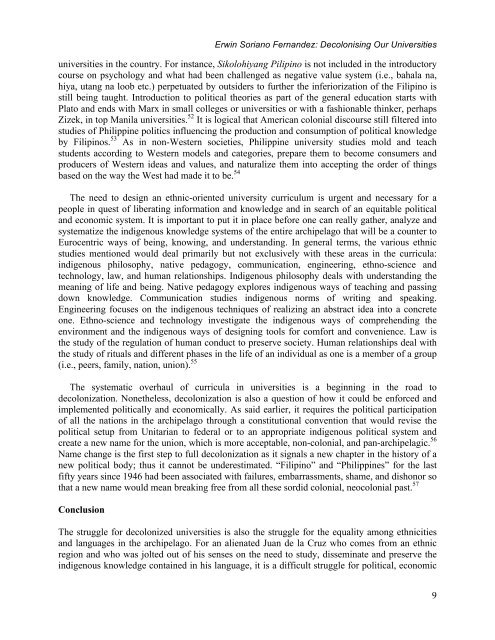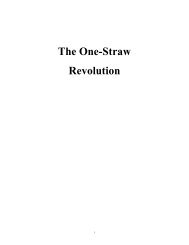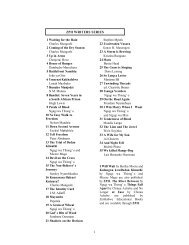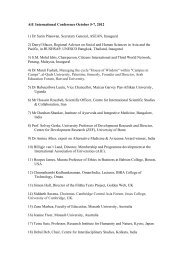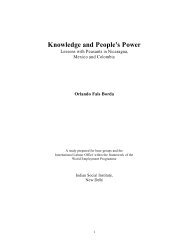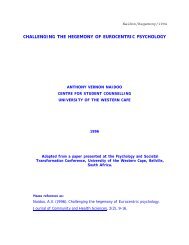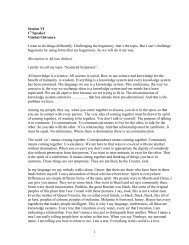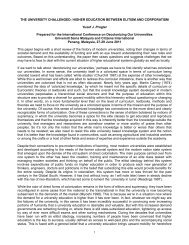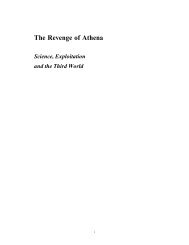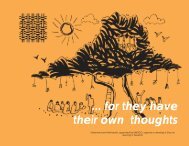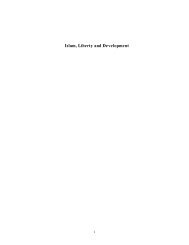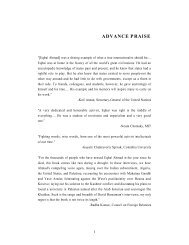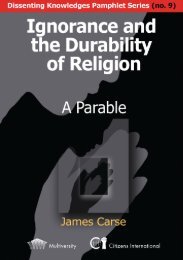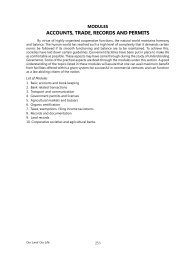1 INTELLECTUAL NEOCOLONIALISM IN THE ... - Multiworld India
1 INTELLECTUAL NEOCOLONIALISM IN THE ... - Multiworld India
1 INTELLECTUAL NEOCOLONIALISM IN THE ... - Multiworld India
Create successful ePaper yourself
Turn your PDF publications into a flip-book with our unique Google optimized e-Paper software.
Erwin Soriano Fernandez: Decolonising Our Universities<br />
universities in the country. For instance, Sikolohiyang Pilipino is not included in the introductory<br />
course on psychology and what had been challenged as negative value system (i.e., bahala na,<br />
hiya, utang na loob etc.) perpetuated by outsiders to further the inferiorization of the Filipino is<br />
still being taught. Introduction to political theories as part of the general education starts with<br />
Plato and ends with Marx in small colleges or universities or with a fashionable thinker, perhaps<br />
Zizek, in top Manila universities. 52 It is logical that American colonial discourse still filtered into<br />
studies of Philippine politics influencing the production and consumption of political knowledge<br />
by Filipinos. 53 As in non-Western societies, Philippine university studies mold and teach<br />
students according to Western models and categories, prepare them to become consumers and<br />
producers of Western ideas and values, and naturalize them into accepting the order of things<br />
based on the way the West had made it to be. 54<br />
The need to design an ethnic-oriented university curriculum is urgent and necessary for a<br />
people in quest of liberating information and knowledge and in search of an equitable political<br />
and economic system. It is important to put it in place before one can really gather, analyze and<br />
systematize the indigenous knowledge systems of the entire archipelago that will be a counter to<br />
Eurocentric ways of being, knowing, and understanding. In general terms, the various ethnic<br />
studies mentioned would deal primarily but not exclusively with these areas in the curricula:<br />
indigenous philosophy, native pedagogy, communication, engineering, ethno-science and<br />
technology, law, and human relationships. Indigenous philosophy deals with understanding the<br />
meaning of life and being. Native pedagogy explores indigenous ways of teaching and passing<br />
down knowledge. Communication studies indigenous norms of writing and speaking.<br />
Engineering focuses on the indigenous techniques of realizing an abstract idea into a concrete<br />
one. Ethno-science and technology investigate the indigenous ways of comprehending the<br />
environment and the indigenous ways of designing tools for comfort and convenience. Law is<br />
the study of the regulation of human conduct to preserve society. Human relationships deal with<br />
the study of rituals and different phases in the life of an individual as one is a member of a group<br />
(i.e., peers, family, nation, union). 55<br />
The systematic overhaul of curricula in universities is a beginning in the road to<br />
decolonization. Nonetheless, decolonization is also a question of how it could be enforced and<br />
implemented politically and economically. As said earlier, it requires the political participation<br />
of all the nations in the archipelago through a constitutional convention that would revise the<br />
political setup from Unitarian to federal or to an appropriate indigenous political system and<br />
create a new name for the union, which is more acceptable, non-colonial, and pan-archipelagic. 56<br />
Name change is the first step to full decolonization as it signals a new chapter in the history of a<br />
new political body; thus it cannot be underestimated. “Filipino” and “Philippines” for the last<br />
fifty years since 1946 had been associated with failures, embarrassments, shame, and dishonor so<br />
that a new name would mean breaking free from all these sordid colonial, neocolonial past. 57<br />
Conclusion<br />
The struggle for decolonized universities is also the struggle for the equality among ethnicities<br />
and languages in the archipelago. For an alienated Juan de la Cruz who comes from an ethnic<br />
region and who was jolted out of his senses on the need to study, disseminate and preserve the<br />
indigenous knowledge contained in his language, it is a difficult struggle for political, economic<br />
9


